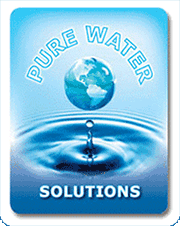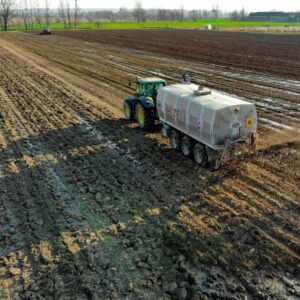In modern agriculture, almost everything is grown with the help of pesticides. When these chemicals are sprayed on nearly everything we eat, we must ask: can they harm us?
The word “pesticides” refers to chemicals used to kill or deter pests. Different pesticides are used on different pests: herbicides for weeds and insecticides for insects, for example. Though some older, harmful pesticides (like DDT) are now banned, over 1,000 pesticides are still used globally, each with its own properties and human health effects.
So they kill weeds and pests, but what about humans? We help break down how pesticides can get in water and what their impacts could be on your health.
How Do Pesticides Get Into the Water Supply?
One of the primary ways that pesticides work their way into the water supply is by seeping through the soil to the groundwater. Around 50 percent of people in the US — and about 95 percent of those living in agricultural areas — rely on groundwater for drinking water.
Pesticides are most widely used in agricultural areas, so concentrations of pesticides are usually higher in those regions. Once in the environment, however, pesticides can easily spread, ending up in water through many paths: precipitation, leaching, runoff, and wind, for example.
This process can take years for chemicals to work their way through soil to the groundwater, creating a time lag between pesticide use and appearance in deeper water reserves. Once there, chemicals can stay in groundwater for decades, even if efforts are made to reduce pesticide use above ground.
Pesticides and Water Pollution
Protecting crops and increasing yields has been a goal for decades now. Chemicals have been used to achieve that goal for as long, but the kinds of chemical used have changed.
Before the 1940s, compounds that included arsenic, mercury, or lead were common. Though these chemicals pose serious threats to human health, they are not very soluble, so they turned up in food more often than in water.
After World War II, pesticides shifted towards synthetic organic compounds, which were thought to be safer. These compounds, including chlorinated hydrocarbons such as DDT, are more attracted to soil than water, and so they tend to accumulate in soil and food chains as opposed to water.
When the toxic health effects of these chlorinated hydrocarbons were discovered, an effort began to replace them with safer, less toxic chemicals. One group of these new pesticides are called carbamates, and they are highly soluble in water.
Thus, while pesticides may be trending safer, they may also appear more frequently in our water sources. Long-term studies are still underway to figure out what the health effects are, but in the meantime, scientists are finding carbamates and their transformation products in our drinking water.
Environmental Protection Agency (or EPA) has health standards for pesticides before being released into the environment, but environmental groups have repeatedly identified chemicals (e.g. chlorpyrifos) that pass EPA’s requirements mark but are later found to be toxic.
What Are the Risks of Pesticides in Water to Human Health?
The effects of pesticides on the human body are as varied as the chemicals themselves. Organophosphates and carbamates, for example, affect the nervous system, while others irritate the eyes or skin. They can be carcinogenic or disrupt the body’s endocrine system.
Scientists are studying both the acute and chronic effects of ingesting pesticides. Pesticides are being detected at low concentrations, and as such, acute toxic effects (like nausea or chemical burns) are of less concern for most people. Farmworkers and landscapers directly applying herbicides and pesticides are likely most at risk (consider the evolving case of glyphosate).
Many are concerned, though, that these chemicals can accumulate over time, leading to greater health effects.
Are There Pesticides in My Drinking Water?
Only small quantities of pesticides have shown up in treated drinking water.
There are two directions of research, however, that promise to illuminate more about how pesticides impact drinking water: 1) cumulative exposures and 2) transformation products.
So far we have been writing about one chemical at a time. In reality, there are multiple herbicides and insecticides present in the environment. Health impacts of cumulative exposure to these compounds are not well understood, which means that our general assessments of risk are likely under-estimating the potential health impacts of pesticide exposures.
As we noted above, scientists have found the transformation products of pesticides in drinking water. A pesticide transformation product is a new chemical formed when the “parent” compound (e.g. DDT) reacts under different conditions – e.g. sunlight or bacteria in the environment or UV treatment in a water treatment facility.
Sometimes, these transformation products are even more toxic than the parent compound. Until engineers and scientists identify the multiple transformation products formed when chemicals enter our treatment systems, we can’t be sure that we are adequately treating our water.
How to Test for Pesticides in Well Water
Assuming you do not currently have a detailed water lab report of the top 35 – 50 Contaminants in your well, the next step might be to test your water using a certified laboratory. The final report will be emailed to you giving you all the required info needed to contact Pure Water Solutions (541-890-2751) for a Professional no obligation consultation and detailed Guaranteed filtration quote, if needed.
If you are concerned or worried about pesticdes in your water, please contact Pure Water Solutions.
541-890-2751
No-Obligation Consultation
We can make any water Perfect – Guaranteed.
We use environmentally safe high-tech filtration systems with both the industry’s top digital control valve and advanced medias. Our systems last 25 – 30 years, have a 10 Year warranty and are virtually maintenance free filtered water without paying for a lifetime of ongoing annual service calls. All our systems are installed by a Licensed Plumber.
As Southern Oregon’s most trusted, bonded, licensed, insured and highest reviewed company for water filtration and treatment.
We are proud to provide service to the following Southern Oregon communities:
Medford, Grants Pass, Ashland, Klamath Falls, Rogue River, Gold Hill, Shady Cove, Trail, Central Point, Eagle Point, White City, Phoenix, Talent, Jacksonville, Applegate, Williams, Murphy, Selma, Cave Junction, and Brookings.

